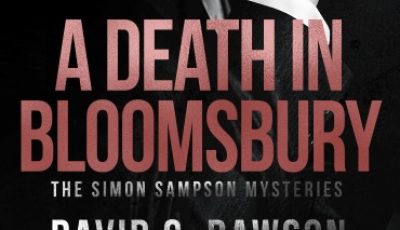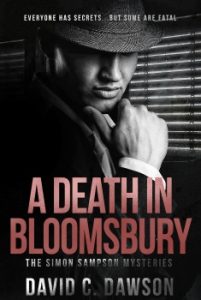

A Death in Bloomsbury by David C. Dawson
 Everyone has secrets… but some are fatal.
Everyone has secrets… but some are fatal.
1932, London. Late one December night, Simon Sampson stumbles across the body of a woman in an alleyway. Her death is linked to a plot by right-wing extremists to assassinate the king on Christmas Day. Simon resolves to do his patriotic duty and unmask the traitors.
But Simon Sampson lives a double life. Not only is he a highly respected BBC radio announcer, but he’s also a man who loves men, and as such must live a secret life. His investigation risks revealing his other life and with that, imprisonment under Britain’s draconian homophobic laws of the time. He faces a stark choice: his loyalty to the king or his freedom.
This is the first in a new series from award-winning author David C. Dawson. A richly atmospheric novel set in the shadowy world of 1930s London, where secrets are commonplace, and no one is quite who they seem.
David C. Dawson recently spent some time with The Big Thrill discussing his latest thriller, A DEATH IN BLOOMSBURY:
What do you hope readers will take away from this book?
I’d like them to have had a real rollercoaster of a read first of all! Simon Sampson has pretty well everything thrown at him as he tries to save the king, and it surprised even me that he survived. But more than that, I’d like readers to have gained an insight into the hidden world gay men in the 1930s were forced to inhabit.
What attracts you to this book’s genre?
This is my first historical novel, and I guess it’s not so much the genre as the period. The 1930s were a fascinating time across the world. There was so much scientific discovery going on, and new art forms were developing based on the cinema and the wireless. Meanwhile, politically, the stage was being set for something unthinkable: another world war. I think there is so much we can learn from events in the 1930s.
What was the biggest challenge this book presented? What about the biggest opportunity?
Researching this period in history was both a challenge and an opportunity. The main events of the time are well documented, but the fine details of everyday life are harder to find. Fortunately, I was able to talk with some people in their nineties (including my mother) who were able to give firsthand accounts of what London life was like in the 1930s. That was a real privilege, and it spurred me on to make some recordings of oral histories.
What authors or books have influenced your career as a writer, and why?
When I’ve read historical novels, I’ve enjoyed the author’s ability to overlay history with a fictional story. One of the best exponents of this is Philip Kerr, whose Berlin Noir series influenced me hugely. So much so that this book is the first in a series, and the second book moves to Berlin in 1933, a huge time in world history.
Is there a question that you feel is important to you or your novel? Write it in below, but be sure to answer it too!
Q: Why was it important for the central character to be gay?
A: To start with, I’m a gay man, and it’s good to see me reflected in the characters I read. Secondly, it adds an extra layer of secrecy. I can’t give too much away as this is intrinsic to the plot, but the fact that Simon Sampson is gay is crucial to what happens to him at the end of the novel.
*****
David C. Dawson is an award-winning author, journalist and documentary maker. He writes British-themed thrillers and mysteries.
His latest novel is his first historical thriller, set in London in 1932.
His debut novel, The Necessary Deaths, won an FAPA award in the best suspense/thriller category. There have been two other books in the series since.
He lives near Oxford with his partner and two cats. In his spare time, he tours Europe and sings with a London choir.
To learn more about the author and his work, please visit his website.
- AudioFile Spotlight: March Mystery and Suspense Audiobooks - March 17, 2025
- Africa Scene: Shadow City by Natalie Conyer - March 17, 2025
- The Ballad of the Great Value Boys by Ken Harris - February 15, 2025

